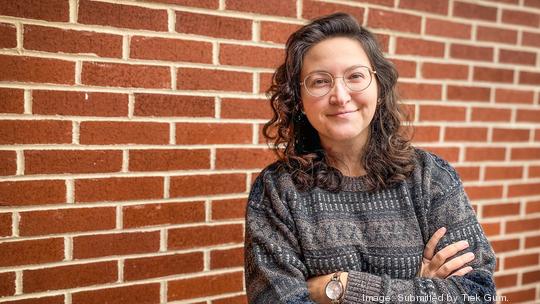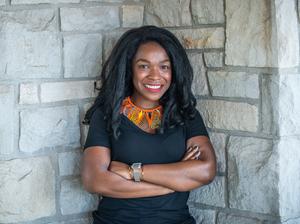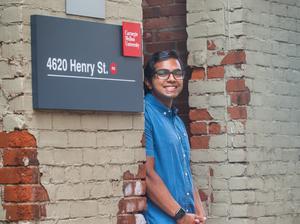
Many millennials have admitted to going two or more days without brushing their teeth, according to research from the Oral Health Group, and during her time in college at the University of Pittsburgh, Emily Siegel found herself falling into that statistic.
Siegel searched for on-the-go oral health solutions, but when single-use plastic products were all she could find, she knew she had to design something new.
In July 2019, Siegel founded Trek Gum to fill that gap in the market with a portable and sustainable option. The startup creates natural chewing gum designed to clean teeth.
While Trek Gum started by targeting the busy millennial market, Siegel said the company has largely expanded its view of its target markets.
She said the gum proved beneficial for individuals with disabilities who cannot hold or use a toothbrush properly and for outdoors enthusiasts on multi-week backpacking trips.
The startup has raised $42,000 since its launch in July 2019, but after raising the money, Siegel said she hit a roadblock.
Many consumer goods startups establish partnerships with co-manufacturers to produce small, initial batches of their products, relying on those manufacturers’ existing machinery and certifications.
Siegel imagined she would follow this formula for producing her gum, but she learned that just a few, large companies have control over the gum market, and their manufacturing processes only work for gums made of synthetic plastics and not natural ingredients.
She faced tough decisions in how to move forward, but she determined that sustainability stood at the core of Trek Gum and she could not compromise that.
“If we want this product to be sustainable and natural, then it is not going to be as quick and easy as we thought,” Siegel said.
Siegel said a vast majority of today’s chewing gum is made of synthetic plastics. It’s so common that Siegel said most people have grown used to the mouth feel of plastic. Due to this familiarity, and the fact that gums with plastic are cheaper to produce, big manufacturers don’t bother changing.
Siegel, however, was not satisfied. She makes Trek Gum out of chicle, a natural ingredient that originated in South America and was used for hundreds of years by the Mayans and in the early days of the gum industry before we “fell in love with plastic,” as Siegel put it.
“The sustainability aspect is super important to us,” Siegel said. “Gum is the second most littered item besides cigarette butts, and it’s a huge problem for the environment. It’s all over our sidewalks and in our waterways, and gum that is made of plastics is going to be around for hundreds if not thousands of years.”
Siegel said she believes consumers are starting to become more conscious of the sustainability of companies they purchase from and where their consumable products end up.
With that in mind, Trek Gum is looking for alternate pathways to market. For now, Siegel manufactures small batches of the gum out of her house, but she said it’s not an efficient process.
For products in the food space, she said it’s important to get into a certified facility, and, especially due to the Covid-19 pandemic, that timeline is fluid.
Siegel said if Trek Gum can manage to find a co-manufacturer, it will use its funding to make some initial small batches, get customer feedback and then start to raise a seed round of funding. If that pathway does not prove viable, Siegel said Trek Gum may look to get into a niche food accelerator program and use its raised money to buy machinery to make its own “mini gum factory.”
Trek Gum uses ingredients already found in oral care products on the market, as well as new ingredients the company discovered through research on oral health. The company plans to use part of its seed round funding for tests to validate the gum’s ability to remove plaque, reduce bacteria and remineralize teeth.
The startup was accepted into the most recent AlphaLab Gear accelerator program, but due to the pandemic, the cohort operated virtually.
“It’s nice to learn from fellow cohort members and go through the trenches of a startup with other people,” Siegel said.
She also said the pandemic caused delays in the delivery of ingredients and other resources. However, she did find the positive in an otherwise challenging year to move forward a new startup.
“It has slowed things down, but it has allowed me to put almost 95% of my brainpower and invest it in the company, because there are no other distractions,” she said.
Q&A
What are the pros and cons of being a young entrepreneur? The biggest pro is the freedom and being able to constantly learn. I think it is really fun that when I work it is going toward something I am passionate about and that I love and not someone else’s dream. It’s something I want to accomplish and know the world could use. It’s very fulfilling in that sense. The biggest con is the instability of everything. I sometimes get jealous of my friends who do work the 9 to 5.
How do you get people to take you seriously as a young entrepreneur? Being introduced to people through networking lets other people know that this person is serious about what they are doing. It’s not just me cold calling people, which I do as well. I find that most of the time people are receptive and happy that they are seeing young people trying to get involved in business and running a company.
What advice would you give to another young entrepreneur? I think that the biggest advice I would give is to have confidence in yourself and what you are doing. It is easy to run into problems … and I think that is a feeling that no matter what age you are that people who are doing startups think they are not the most qualified person to be doing this. … But just put your head down, read, learn, ask questions. It’s okay to feel dumb, but that you are capable of doing things that seem hard.
TIMELINES
Personal:
2014
Moved from hometown of York to Pittsburgh to attend the University of Pittsburgh
December 2016
Graduated from Pitt with degrees in biology and chemical engineering
Professional:
Spring 2019
Won Pitt’s Randall Family Big Idea Competition
Fall 2019
Won the regional AlphaLab Gear Hardware Cup pitch competition
June 2020
Started the AlphaLab Gear hardware accelerator program
BIOBOX
Age: 25
Title: Founder and CEO
Company: Trek Gum
What is your dream job? “Before Trek Gum, my dream job was to open a brewery. I love craft beer. I think it combines science and creativity and recipe development. I wanted to open a brewery and put it on a boat to travel around.”
If you could have a conversation with anyone, who would it be? “After the year we have just had, I’d really like to meet my favorite comedian — Nate Bargatze. Comedy has always been my preferred form of stress relief.”









